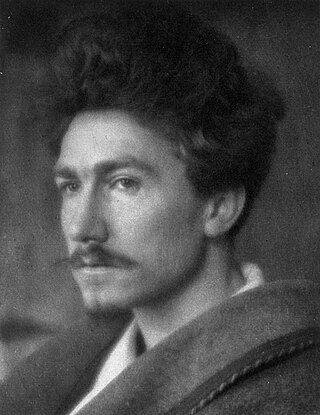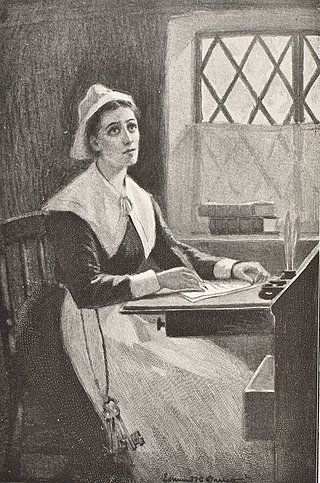Related Research Articles

Thomas Stearns Eliot was a poet, essayist, publisher, playwright, literary critic and editor. He is considered to be one of the 20th century's greatest poets, as well as a central figure in English-language Modernist poetry. His use of language, writing style, and verse structure reinvigorated English poetry. He is also noted for his critical essays, which often reevaluated long-held cultural beliefs.

Ezra Weston Loomis Pound was an expatriate American poet and critic, a major figure in the early modernist poetry movement, and a collaborator in Fascist Italy and the Salò Republic during World War II. His works include Ripostes (1912), Hugh Selwyn Mauberley (1920), and his 800-page epic poem, The Cantos.

Robert Laurence Binyon, CH was an English poet, dramatist and art scholar. Born in Lancaster, England, his parents were Frederick Binyon, a clergyman, and Mary Dockray. He studied at St Paul's School, London and at Trinity College, Oxford, where he won the Newdigate Prize for poetry in 1891. He worked for the British Museum from 1893 until his retirement in 1933. In 1904 he married the historian Cicely Margaret Powell, with whom he had three daughters, including the artist Nicolete Gray.

Hilda Doolittle was an American modernist poet, novelist, and memoirist who wrote under the name H.D. throughout her life. Her career began in 1911 after she moved to London and co-founded the avant-garde Imagist group of poets with American expatriate poet and critic Ezra Pound. During this early period, her minimalist free verse poems depicting Classical motifs drew international attention. Eventually distancing herself from the Imagist movement, she experimented with a wider variety of forms, including fiction, memoir, and verse drama. Reflecting the trauma she experienced in London during the Blitz, H.D.'s poetic style from World War II until her death pivoted towards complex long poems on esoteric and pacifist themes.

Marianne Craig Moore was an American modernist poet, critic, translator, and editor. Her poetry is noted for its formal innovation, precise diction, irony, and wit. She was nominated for the 1968 Nobel Prize in Literature by Nobel Committee member Erik Lindegren.

Anne Bradstreet was the most prominent of early English poets of North America and first writer in England's North American colonies to be published. She is the first Puritan figure in American Literature and notable for her large corpus of poetry, as well as personal writings published posthumously.
Envoi or envoy in poetry is used to describe:
A Shropshire Lad is a collection of sixty-three poems by the English poet Alfred Edward Housman, published in 1896. Selling slowly at first, it then rapidly grew in popularity, particularly among young readers. Composers began setting the poems to music less than ten years after their first appearance, and many parodists have satirised Housman's themes and poetic style.

Dorothy Shakespear was an English artist. She was the daughter of novelist Olivia Shakespear and the wife of American poet Ezra Pound. One of a small number of women vorticist painters, her art work was published in BLAST, the short-lived but influential literary magazine.

Mary de Rachewiltz is an Italian-American poet and translator.
James Longenbach was an American critic and poet. His early critical work focused on modernist poetry, namely that of Ezra Pound, W.B. Yeats, and Wallace Stevens, but came to include contemporary poetry as well. His book of criticism, The Resistance to Poetry, has been described as a "compact and exponentially provocative book." Longenbach published six volumes of poetry including Earthling (2017), which was a finalist for the National Book Critics Circle Award.
Kundalakesi, also called Kuntalakeciviruttam, is a Tamil Buddhist epic written by Nathakuthanaar, likely sometime in the 10th-century. The epic is a story about love, marriage, getting tired with the married partner, murder and then discovering religion.
This article lists all known poems by American author and critic Edgar Allan Poe, listed alphabetically with the date of their authorship in parentheses.

"Strange fits of passion have I known" is a seven-stanza poem ballad by the English Romantic poet William Wordsworth. Composed during a sojourn in Germany in 1798, the poem was first published in the second edition of Lyrical Ballads (1800). The poem describes the poet's trip to his beloved Lucy's cottage, and his thoughts on the way. Each of its seven stanzas is four lines long and has a rhyming scheme of ABAB. The poem is written in iambic tetrameter and iambic trimeter.

The Lucy poems are a series of five poems composed by the English Romantic poet William Wordsworth (1770–1850) between 1798 and 1801. All but one were first published during 1800 in the second edition of Lyrical Ballads, a collaboration between Wordsworth and Samuel Taylor Coleridge that was both Wordsworth's first major publication and a milestone in the early English Romantic movement. In the series, Wordsworth sought to write unaffected English verse infused with abstract ideals of beauty, nature, love, longing, and death.
"A slumber did my spirit seal" is a poem that was written by William Wordsworth in 1798 and first published in volume II of the 1800 edition of Lyrical Ballads. It is part of a series of poems written about a mysterious woman named Lucy, whom scholars have not been able to identify and are not sure whether she was real or fictional. Although the name Lucy is not directly mentioned in the poem, scholars nevertheless believe it to be part of the "Lucy poems" due to the poem's placement in Lyrical Ballads.

Olivia Shakespear was a British novelist, playwright, and patron of the arts. She wrote six books that are described as "marriage problem" novels. Her works sold poorly, sometimes only a few hundred copies. Her last novel, Uncle Hilary, is considered her magnum opus. She wrote two plays in collaboration with Florence Farr.
Coal is a collection of poetry by Audre Lorde, published in 1976. It was Lorde's first collection to be released by a major publisher. Lorde's poetry in Coal explored themes related to the several layers of her identity as a "Black, lesbian, mother, warrior, poet."

Cathay (1915) is a collection of classical Chinese poetry translated into English by modernist poet Ezra Pound based on Ernest Fenollosa's notes that came into Pound's possession in 1913. At first Pound used the notes to translate Noh plays and then to translate Chinese poetry to English, despite a complete lack of knowledge of the Chinese language. The volume's 15 poems are seen less as strict translations and more as new pieces in their own right; and, in his bold translations of works from a language he was unfamiliar with, Pound set the stage for modernist translations.
David Happell Hsin-fu Wand (1931–1977) was a poet, translator, collaborator with William Carlos Williams and Ezra Pound, and editor responsible for the popularization of Asian-American literature through his 1974 anthology Asian American Heritage: An Anthology of Prose and Poetry. After espousing virulently neo-fascistic and segregationist views in the 1950s under the tutelage of Pound, Wand moved to California in the 60s and became a supporter of the Black Power movement, seeing parallels between the Asian-American and African-American experience.
References
- ↑ Zhang, Yu (Fall 1998). "Ezra Pound's "The River-Merchant's Wife: A Letter": On Mistranslation Of The Two Allusions". Paideuma. 27 (2/3): 185–194.
- ↑ Qian, Zhaoming (2010). The Orient. Cambridge University Press. ISBN 978-0-521-51507-8.
- ↑ Hunter, J. Paul (1986). The Norton Introduction to Poetry. Norton.